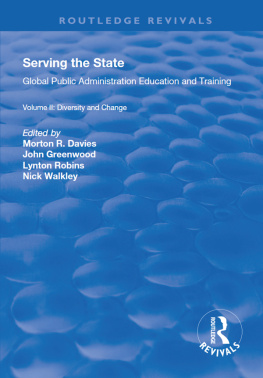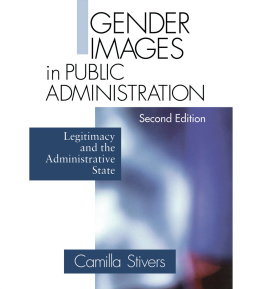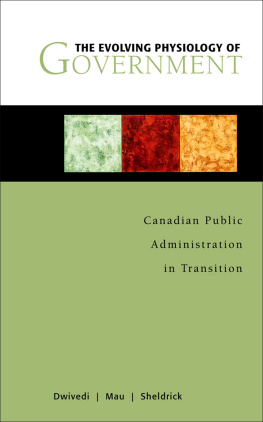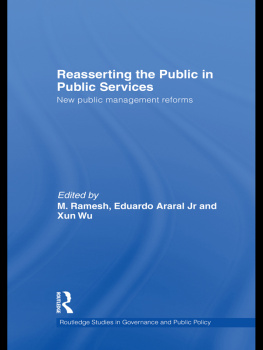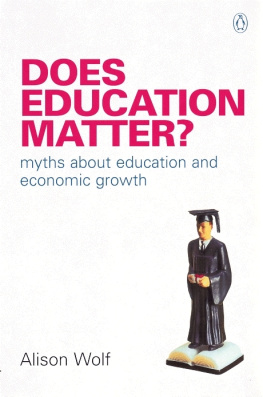SERVING THE STATE
Serving the State
Global Public Administration Education and Training
Volume II: Diversity and Change
Edited by
MORTON R. DAVIES
University of Liverpool
JOHN GREENWOOD
De Montfort University, Leicester
LYNTON ROBINS
De Montfort University, Leicester
NICK WALKLEY
John Moores University, Liverpool
First published 2000 by Ashgate Publishing
Reissued 2018 by Routledge
2 Park Square, Milton Park, Abingdon, Oxon OX14 4RN
711 Third Avenue, New York, NY 10017, USA
Routledge is an imprint of the Taylor & Francis Group, an informa business
Copyright Morton R. Davies, John Greenwood, Lynton Robins and Nick Walkley 2000
All rights reserved. No part of this book may be reprinted or reproduced or utilised in any form or by any electronic, mechanical, or other means, now known or hereafter invented, including photocopying and recording, or in any information storage or retrieval system, without permission in writing from the publishers.
Notice:
Product or corporate names may be trademarks or registered trademarks, and are used only for identification and explanation without intent to infringe.
Publishers Note
The publisher has gone to great lengths to ensure the quality of this reprint but points out that some imperfections in the original copies may be apparent.
Disclaimer
The publisher has made every effort to trace copyright holders and welcomes correspondence from those they have been unable to contact.
A Library of Congress record exists under LC control number: 98002532
ISBN 13: 978-1-138-71686-5 (hbk)
ISBN 13: 978-1-315-19682-4 (ebk)
Contents
Tao-Chiu Lam and Hoi-Kwok Wong
Pertti Ahonen and Ari Salminen
Hlne Gadriot-Renard
Frits M. van der Meer and Frans K.M. van Nispen
John Greenwood and Barbara Kudrycka
Ahmed H. Al-Hamoud
Godfrey Pirotta, Charles Polidano and Edward Warrington
Kerstin Kolam
Anatolii Oleksienko
Marco Cupolo
Morton R. Davies
Pertti Ahonen
Professor of Public Administration at the University of Tampere, Finland.
Ahmed H. Al-Hamoud
Assistant Professor of Public Administration, Assistant Director of Private Sector Programmes at the Institute of Public Administration in Saudi Arabia.
Marco Cupolo
Professor of Public Administration at the Simn Bolvar University, Caracas, Venezuela.
Morton R. Davies
Professor of Public Administration and Head of Department at Liverpool Institute of Public Administration and Management, University of Liverpool, United Kingdom.
Hlne Gadriot-Renard
Directeur, Formation et Programmes at the Institute International dAdministration Publique (IIAP), Paris, France.
John Greenwood
Professor of Public Administration and Programmes Director of the International Public Administration and Management Unit at De Montfort University, Leicester, United Kingdom.
Kerstin Kolam
Director of Studies, Department of Political Science, Ume University, Sweden.
Barbara Kudrycka
Professor of Administrative Law and Public Administration at the University of Bialystok, and Rector of the School of Public Administration, Bialystok, Poland.
Tao-Chiu Lam
Assistant Professor of Public Administration at the Hong Kong Polytechnic University
Anatolii Oleksienko
Dean of Public Administration at the Institute of Public Administration, Ukraine.
Godfrey Pirotta
Senior Lecturer in Public Policy at the Department of Public Policy, University of Malta.
Charles Polidano
Staff Development Director, Government of Malta.
Lynton Robins
Co-ordinator for Public Administration at De Montfort University Leicester, United Kingdom.
Ari Salminen
Professor of Public Administration, University of Vaasa, Finland.
Frits M. van der Meer
Associate Professor of Public Administration, School of Social Sciences at the University of Leiden, The Netherlands.
Frans KM. van Nispen
Associate Professor of Public Administration and Director of International Programmes at the School of Social Sciences, Erasmus University of Rotterdam, The Netherlands.
Nick Walkley
Lecturer in Public Management at the John Moores University, Liverpool.
Edward Warrington
Lecturer in Public Policy at the Department of Public Policy, University of Malta.
Hoi-Kwok Wong
Principal of the College of Higher Vocational Studies at the City University of Hong Kong.
Foreword
Volume II: Diversity and Change
The first volume of Serving the State focused upon the Anglo-American tradition of Public Administration Education and Training. It revealed a training capability attempting to respond to world-wide changes in the practice of public administration, to the increasing complexity of public problems, the fragmentation of public service providers, the growing complexity of public policy and rapid changes and technology. At the same time the academic discipline, faced with the public sector managerial revolution, and new global concerns and movements, has faced doubt about its disciplinary relationships with business and management and about its essential core. In many parts of the world there has been a retreat from the social sciences, and a fracturing of the discipline into functional disciplines which at crucial points may not interconnect. Consequently, the discipline in many parts of the world may become incoherent and blurred in focus. Its relevance to public sector recruitment and employment patterns depends crucially on the extent to which programmes remain professionally relevant, and - even then - to the extent to which employers attach preference to relevance. Where it fails to achieve this, an even greater responsibility falls to those providing in-service training for public sector employees.
A recurrent of the chapters in these two volumes is that Public Administration education and training cannot be divorced from changes occurring within public administration itself. In this context one factor that is often overlooked is that Public Administration educators and trainers are often themselves public sector employees, former employees, or consultants, and to this extent are not simply an observer of changing processes but a participant within it.
As a result practice in the classroom reflects much of the experience gained on the job as well as theory, and the Public Administration pedagogy is thus a part of as well as a reflection of the challenges that confront the public sector.
At the same time the nature of a countrys education system also has an impact. For example, in a developing country where educational opportunities are few, or where rapid transition can render existing skills and knowledge obsolete, there may be insufficient qualified and experienced trainers and educators available to support changes in public administration. Another crucial factor is the value placed by society and governments on public administration itself. In a job market offering relatively few opportunities for public sector employment, or significantly lower salaries than available in the private sector, the raw material for training and education in the classroom may not be come available.

